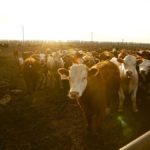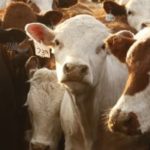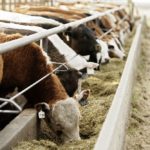Western Canadian feeder cattle markets traded $3-$5 above week-ago levels on average; stronger buying interest was noted on short-keep cattle with prices quoted $5 to as much as $8 higher. Feedlot operators stepped forward more aggressively with ideas that yearling supplies will dwindle over the next month. Quality cattle are starting to thin out at […] Read more

Klassen: Renewed confidence lifts feeder cattle market
If you see a profit, take it
Markets have improved, but it likely won’t last
Fed and feeder cattle have been percolating higher over the past month as the market moves through a period of seasonal low beef production. Restaurant traffic sharply improves in March and April, and retail beef movement also increases. Consumers generally start eating more once spring rolls around and this year, the health of the overall […] Read more

Klassen: Limited demand means mixed tone for feeders
Western Canadian feeder cattle prices experienced a mixed tone this past week. Heavier weaned calves were trading steady to as much as $4 higher compared to last week; however, shorter-term replacements were steady to $3 lower. Alberta packers were buying fed cattle in the range of $170 to $172, down from week-ago levels of $177. […] Read more

Understanding feeder cattle options
The Markets: Using a “put” option to avoid margin calls
In the previous three columns on feeder cattle marketing (found in the ‘On our network’ column on the right-hand side of this page), I’ve discussed hedging feeder cattle production using the feeder cattle futures market. Many producers hesitate to use a futures market because of the cash flow requirements. When you sell a futures contract, there […] Read more

Klassen: Feeder cattle upward trend stalls
Western Canadian feeder cattle prices were relatively unchanged from week-ago levels. Noticeable slippage was noted in shorter-keep cattle while lighter weight categories experienced spurts of $2-$3 above last week’s prices. Alberta packers were buying fed cattle at $292 on a dressed basis, up about $4-$6 from week-ago levels. However, auction rings experienced a subdued tone […] Read more

Klassen: Feeder cattle continue upward trend
Western Canadian feeder cattle prices traded $3-$5 above week-ago levels with lighter weight categories selling $6 to $8 higher. Alberta packers were buying fed cattle in the range of $286 to $288 on a dressed basis, up from $278 last week. This equates to $172-$174 on a live basis, a solid $35 above break-even pen […] Read more

Klassen: Feeder cattle continue upward trend
Western Canadian feeder cattle prices traded $3-$5 above week-ago levels with higher-quality cattle as much as $8 higher. Once again, stronger fed cattle prices and healthy feedlot margins were the main factors driving the market, especially in the heavier weight categories. Feedlots have liquidated a larger amount of fed cattle over the few weeks and […] Read more
Understanding risk for feeder cattle: Pt. 3
The Markets: Don’t buy unless the basis is favourable for a profit
This is the third article in the ‘Understanding risk for feeder cattle’ series. I started by explaining the feeder cattle futures market and basic theory of hedging. The second column focused on average basis levels and using these basis levels to forecast an expected selling price. I analyzed the risk and reward of backgrounding 550-pound […] Read more

Klassen: Feeder cattle jump on healthy margin structure
Western Canadian feeder cattle jumped $3-$5 on average last week, with 800-plus-lb. yearlings trading as much as $8 higher. Historically high finishing margins finally resonated with feedlot operators and a precarious attitude from recent weeks was thrown by the wayside. Order buyers were inundated with interest as bids were relatively firm across the Prairies. Adverse […] Read more
General movement toward higher production
Market Update: Feeder cattle prices may not get much better than they are right now
Fed cattle prices were hovering in the range of $158 to $160 in mid-February, slightly lower than month-ago levels. The markets are relatively strong and I’m expecting the yearly highs to occur over the next month. First-quarter beef production is coming in marginally lower than anticipated, but supplies are building. The recent cattle-on-feed report and […] Read more


